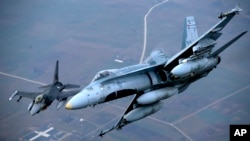Russian news agencies are reporting a NATO fighter jet buzzed a plane carrying Russian Defense Minister Sergei Shoigu on Wednesday as it flew over the Baltic Sea, but was escorted away by a Russian escort jet.
The NATO jet approached the defense minister's jet while flying over neutral waters. The Russian jet flew in between Shoigu's plane and the NATO jet and tilted from side-to-side to show it was armed. The NATO jet then left the area and the Russian jet got back in formation, the Russian agencies reported.
NATO says the encounter was "standard procedure."
A Senior NATO military representative told VOA there had been an unusually high number of Russian military aircraft flying over the Baltic Sea last week and it is standard practice for NATO air forces to monitor unknown aircraft approaching NATO airspace.
“Generally, when NATO aircraft intercept a plane they identify it visually, maintaining a safe distance at all times. Once complete, NATO jets break away. This is standard procedure. All our pilots behave in a safe and responsible way,” the official said.
Shoigu was en route to the western Russian city of Kaliningrad for a meeting with other members of Russia's defense ministry.
The incident comes just a day after an armed Russian fighter jet came within just a few meters of a U.S. military plane flying over the Baltic Sea Tuesday.
The Pentagon said the American plane, an RC-135 reconnaissance aircraft, was unprofessionally "intercepted" in international airspace on Monday by a Russian SU-27 Flanker fighter jet.
"Due to the high rate of closure speed and poor control of the aircraft during the intercept, this interaction was determined to be unsafe," Defense Department spokeswoman Army Lt. Col. Michelle Baldanza told VOA Tuesday.
Baldanza stressed that the American reconnaissance plane "did nothing to provoke" the Russian jet's behavior.
Close encounters take place on a regular basis among military aircraft operating in international areas. The vast majority of encounters with American military planes are conducted in a safe manner, officials said.
Pentagon correspondent Carla Babb contributed to this report





